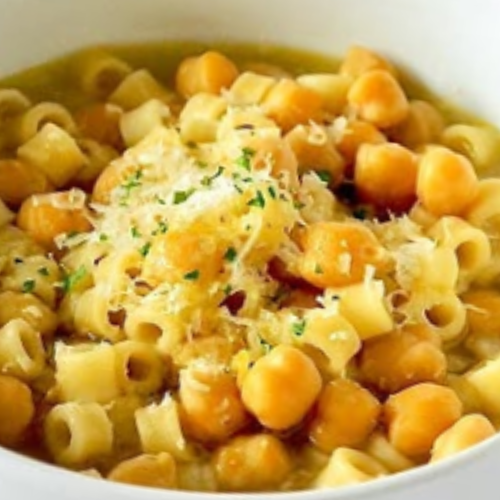Method:
Prepare the Chickpeas: If using dried chickpeas, soak them overnight and drain them before using. For canned chickpeas, just rinse and drain them.
Sauté the Aromatics: In a large pot, heat the olive oil over medium heat. Add the chopped onion and garlic and sauté until soft and translucent (about 5 minutes).
Add the Chickpeas: Stir in the chickpeas, rosemary, and bay leaf. Let everything cook together for another 5 minutes, allowing the flavors to meld.
Simmer: Pour in the broth (or water) and bring the mixture to a boil. Reduce the heat and simmer for 20-30 minutes until the chickpeas are tender and have absorbed the flavors.
Blend for Creaminess: If you prefer a creamier texture, remove half of the chickpeas and blend them with a little broth, then stir it back into the soup.
Cook the Pasta: Add the pasta to the soup and cook according to the package instructions, typically about 8-10 minutes. Stir occasionally.
Season: Taste and adjust seasoning with salt and pepper.
Serve: Ladle the pasta and chickpeas into bowls. Garnish with fresh parsley and a sprinkle of Parmesan cheese, if desired.
Variations:
Tomato Version: In Tuscany or Sicily, some like to add tomatoes (either fresh or passata) for a redder, more robust flavor.
Roman Style: Add anchovies in the soffritto (early stage of cooking) for an extra depth of flavor. This gives it a distinctive taste you’ll find in Lazio.
Neapolitan Style: In Naples, a bit of chili pepper and fresh parsley are added to give the dish a slight kick.
Tips and Substitutions:
For a Vegan Version: Skip the Parmesan and use olive oil for richness.
For Gluten-Free: Use gluten-free pasta or rice instead of the traditional pasta.
For a Heavier Dish: Add guanciale or lard to the soffritto for more richness (though this would no longer be vegetarian).
Cooking Ahead: You can make the chickpea base ahead of time, and then cook the pasta when you’re ready to serve.
